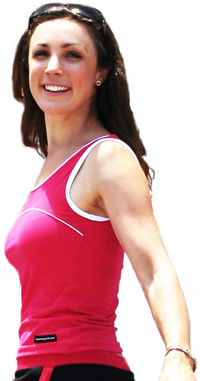The Mental Edge
 The greatest predictor of athletic success is the perception of being prepared. That ‘s why a strong pre-competition routine which encompasses training for mind and body is vital for success in competition – if you feel fully prepared then you’re likely to perform at your best.
The greatest predictor of athletic success is the perception of being prepared. That ‘s why a strong pre-competition routine which encompasses training for mind and body is vital for success in competition – if you feel fully prepared then you’re likely to perform at your best.
Most of the triathletes with whom I’ve worked over the years have paid close attention to their physical training requirements. Nutrition, hydration, strength and physical conditioning needs are generally comprehensively incorporated into training schedules. It’s therefore mental performance which regularly becomes the element that sets one competitor apart from another because it’s the mental state which shows greatest variability.
Pre-competition routines are the most common structures to put into place when an athlete first starts working with me. The mental and behavioural techniques we develop together reflect three main elements: the timing of training in relation to competition; the amount of time available to engage in mental exercises and the individual needs of the athlete.
Often, with my athletes, I break down pre-competition time into roughly discrete periods:
- Early on – can be up to six months or more out from competition
- Leading up – one to two months out
- Fortnight checkpoint pre-event
- Week for fine-tuning pre-event
- Night before event
- Morning of event
- Just prior to event (if not held first thing in the morning)
- During event
- Post event
Each time period is suited to different mental training approaches.
For example, months away from competition, we tend to work on setting training goals and the optimal mindset for training sessions. For some parts of the training season, motivation levels can fluctuate, so we spend a considerable period ensuring that you have a clear and personally-valued picture of why you’re training in the first place. By creating this picture, we can then tap into the drive it elicits from you when motivation can waver due to fatigue or external factors. For team athletes, it’s often the presence of other team members which provides the drive; for individual athletes, that picture is personal. Your picture is also crucially important as it can ultimately determine whether you succeed or fail due to the impact it will have on your application to a thorough preparation.
Take the time to build your picture of why you compete: what do you see, hear, feel, taste and smell in that picture in your mind? Make that picture as alive as possible and pull it up at the start of every training session and your intensity and focus will improve.
Away from training, we ensure that mental recovery is achieved as efficiently as possible. I often refer to a short period between one activity and the next as taking “buffer time” – to “zero” yourself between meetings or engagements to enable your brain to feel as in control as possible and minimise energy wastage.
As competition approaches, we continue to monitor that an effective “energy management plan” is in place to ensure that more energy enters an athlete’s system (through a number of techniques including positive internal self “chats”) than leaves it. This also significantly contributes to minimising your mental burnout or injury incursion and well as improving training output.
In anticipation of competition day, the key is to develop a “toolkit” of strategies that reflect your personal needs. For many athletes, pre-competition nerves are the greatest concern; for others, getting themselves “psyched” for smaller events when they’re used to competing at higher levels can be the challenge. It is equally important to gain effective mental closure post an event: as Rudyard Kipling once wrote “If you can meet with Triumph and Disaster and treat those two imposters just the same...” you’ll be a far more effective athlete in the long-term due to faster recovery times and less negative “hangover” from poor performances – or less of a complacency hangover from strong performances.
Over the next few months, I’ll be describing different techniques to use at those different pre-competition time stages. You then need to apply those tools to best fit your individual situation. Some of the strategies you may find that you already use, either because they’re something you’ve naturally acquired or perhaps you’ve already consulted a mental skills expert. Your success in using the strategies will depend on making them relevant to you and then training with them regularly as much as possible, so they become your “default” mechanisms when you need them most.
Miranda Banks is a sports psychologist who has worked in Australia for the last ten years with professional and elite individual and team athletes. She is the author of book “Fitter, Faster, Stronger, Smarter. Training for the performance of life” which is available online through www.dymocks.com.au. She has lectured in sports psychology for six years at Brisbane universities and has returned to her native England to provide mental skills training to UK sports and businesses. You can learn more and contact Miranda through www.mirandabanks.com.

